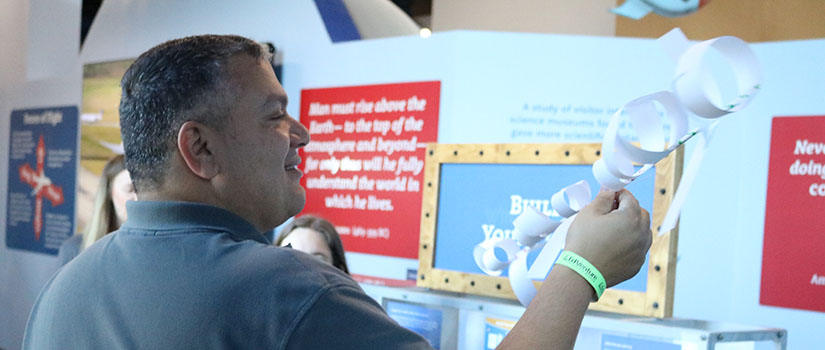Since joining the College of Engineering and Computing (CEC) in 2014, Mechanical Engineering Professor Ramy Harik has had a passion for introducing and highlighting scientific topics to various audiences throughout South Carolina. For his dedication, Harik was recognized by the state of South Carolina this past March.
Harik was named winner of the 2024 Governor’s Award for Excellence in Scientific Awareness. The award, presented by the South Carolina Academy of Science (SCAS), is given to an individual whose achievements have had significant impact on science education in South Carolina and who has promoted a wider awareness of science to merit special recognition. The achievements include formal education activities or service to science through non-formal education. Harik was recognized at the 2024 SCAS Annual Meeting in March. He will also be recognized later this year at a Governor’s Award Ceremony at the South Carolina Statehouse.
“This is the most meaningful award I feel I can receive at the state level. I love teaching and research, but this award is not about either. It's more about spreading awareness of science across the board and beyond the university to enable both,” Harik says.
Harik has created a thriving initiative with the objectives of building a strong STEM foundation to prepare a future workforce, engage the education system, increase diversity, inclusion and equity, and develop strategic partnerships. This includes interaction with elementary, middle, high schools and technology centers.
Harik’s activities include a variety of scientific initiatives. This includes highlighting the University of South Carolina’s McNair Center and classroom engagements by conducting hands-on STEM activities such as robotics and manufacturing simulations. Harik has also introduced countless number of high school students to STEM pathways at career days and created university collaborations by facilitating courses such as smart manufacturing across different universities.
At the CEC, Harik led the university’s Instructional Development (INDEV) committee supporting the transition to online modules during the COVID-19 pandemic, oversaw the modernization of manufacturing classrooms and created the McNair Junior Fellows program, which provides undergraduate students hands-on experimental learning to develop and expand their research interests. He has also authored two books including, “Manufacturing vs. Corruption: Who Wins?” which earned the Distinguished Favorite book for Social/Political Change at the Independent Press Award. The book creates a roadmap for societies to ground themselves in manufacturing to lift all its constituents.
Harik considers science awareness for K-20 and beyond. This covers primary and secondary education and continuing to higher education. But Harik goes further to include science awareness beyond education to the professional world. His goal is to determine and create different initiatives for creating an ecosystem that pushes science forward.
“All of these activities are spread throughout the K-20 science awareness. I’m always looking for ways to build activities for each group. For me, this is something I fundamentally believe in because it leads society to enhance the overall ecosystem,” Harik says.
Harik also works with the EdVenture Children’s Museum in Columbia, where his team helps set up aerospace exhibits and leads activities for middle and high school students. He also suggested that the museum’s FLIGHT exhibit should have the nose of a 757 coming out of the building, which can be seen by drivers traveling into downtown Columbia over the Gervais Street bridge.
"Dr. Harik has been a tremendous partner to us for over eight years,” says Marc Drews, EdVenture director of experiences and education. “He is always there for us when we need advice or support for our STEM exhibits and offerings. I think the reason we click so well is he has an excited ten-year-old spirit of wonder and curiosity within him with an insatiable desire to learn and share with others."
Harik believes that continuing to dedicate himself to science awareness is a continual, positive cycle that aims to make people want to do better in STEM education and related careers. For example, one of Harik’s current graduate students attended a high school camp hosted by the college, which cultivated his interest in research.
“This award takes everything I’m trying to do to spread awareness for science,” Harik says. “The more awareness, the more people are enticed to science and the more inventions get done to improve people's lives.”
